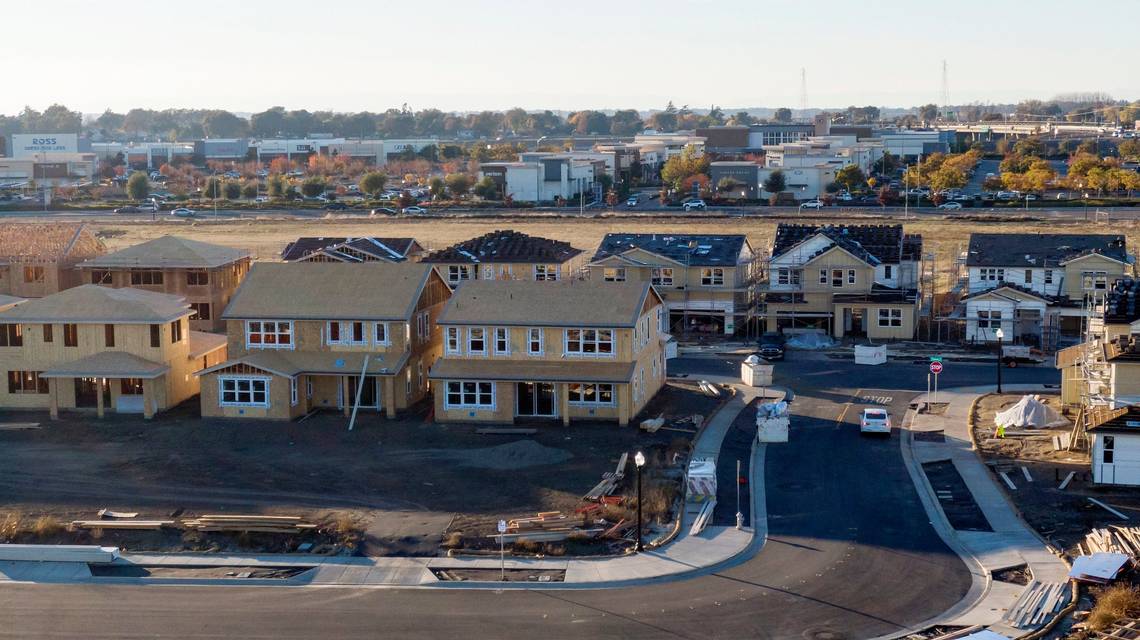
New homes built in California are more likely to have all-electric appliances starting in 2026 after energy regulators approved new state building standards Wednesday that encourage adoption of heat pumps.
California Energy Commission leaders called the new state building code an important step on the path to removing carbon pollution from buildings, which is is critical to meeting the state’s climate goals.
“There’s nothing unsure about it, our climate is changing very fast and it is an absolute need for us to act as quickly as we can,” said commission Vice Chair Siva Gunda. “It’s about how you match that ambitioun with pragmatism and manage the transition.”
Commission staff said the new code will save almost $5 billion in energy costs and cut 4 million metric tons of carbon emissions over three years. Much of that would be due to at least 500,000 new heat pumps to heat and cool homes, they estimated.
Heat pumps are temperature control appliances powered by electricity that can warm or cool a building’s air, acting as both a furnace and an air conditioner rolled into one. They can also warm and cool water.
Electricity-powered heat pumps are more energy efficient than gas-powered furnaces and water heaters, which create the majority of most buildings’ carbon emissions.
By setting more stringent efficiency standards for new home construction, commission leaders said the new building code serves to encourage installation of heat pumps without an outright mandate to neglect gas appliances.
The commission adopted a less ambitious version of a previous draft, which would have required all broken A/C units to be replaced with a heat pump. Several environmental advocates lamented that walkback at a commission meeting ahead of the vote.
Instead, the rules open the door for local governments to incorporate their own heat pump replacement requirements.
The new rules also require replacing broken large rooftop heating and air-conditioning units on existing retail buildings, schools, offices and libraries with high efficiency systems including heat pumps.
California is vying to reach carbon neutrality by 2045. Buildings, primarily the gas-powered appliances used to condition air and heat water, produce up roughly a quarter of the state’s planet-warming carbon emissions.
Meanwhile, the energy commission is vying to quadruple the number of homes with electricity-powered heat pumps to 6 million by 2030. The latest state numbers show more than 1 million have been installed in the state’s roughly 14 million homes.
California’s building standards regulate the construction of new buildings, additions and alterations. Updated every three years, they also addresses what appliances those buildings can use.
Matt Vespa, senior attorney at environmental law nonprofit Earthjustice, said approval of the new code will send a strong market signal for more builders to go all-electric in new home construction.
“This is a significant step as we remove fossil fuels from our buildings,“ he said. “This code really does go as far as it can in encouraging all-electric homes. And we’ll see more heat pump deployment and a lot more emissions reductions.”
The primary opponents to the building code have been industrial groups representing gas appliance manufacturers, which pushed back on the proposed codes in comments to the CEC Wednesday.
Western Propane Gas Association representative Krysta Wanner warned that the rules could compound consumer energy costs. She also argued the code is in violation of federal energy law, an issue that the city of Berkeley ran into when attempting to ban gas hookups in new buildings locally.
“The 2025 performance path will, in practice, prevent certain fuels from being used across all climate zones and functions as a de facto ban,” she said, citing the need for homeowners to choose propane furnaces as a more affordable option.
The new state building code will take effect on Jan. 1, 2026.
EMEA Tribune is not involved in this news article, it is taken from our partners and or from the News Agencies. Copyright and Credit go to the News Agencies, email news@emeatribune.com Follow our WhatsApp verified Channel



